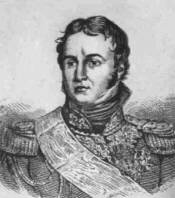General Frédéric-Henri Walther

Born: June 20, 1761
Place of Birth: Obenheim, Bas-Rhin, France
Died: November 24, 1813
Cause of Death: Fatigues of war
Place of Death: Kusel, Germany
Arc de Triomphe: WALTHER on the east pillar
Pronunciation:
A career soldier, Frédéric-Henri Walther enlisted as a hussar at age nineteen in 1781. With the arrival of the Revolution in 1789, he was finally commissioned as a sous-lieutenant in September of 1789. In 1792 Walther was promoted to lieutenant and later to capitaine and he served in the Army of the North. The next year he fought at Neerwinden where he was wounded by a shot to the left arm. Sent to the Army of the Alps, Walther was promoted to chef d'escadrons in the 1st Hussars in May of 1793. Next he served at the Siege of Lyon where he was promoted to chef de brigade by the representatives of the people with the army. After the conclusion of the siege, Walther received yet another promotion, this time to général de brigade.
In 1794 General Walther was ordered to organize the cavalry of the Army of the Alps and the cavalry depots. Two years later in November of 1796 he was sent to the Army of Italy where he took command of the cavalry reserve there. In 1797 Walther was commanding the cavalry of Augereau's division when he fought at the Piave, and in May he joined Dumas' division as a brigade commander.
General Walther initially served in the Army of England in 1798 and then transferred to the Army of Mainz. In January of 1799 he joined the Army of the Danube in Gouvion St. Cyr's division and that March he fought at Pfullendorf and Stockach. In the year 1800 Walther took command of a brigade of light cavalry in the right wing of the Army of the Rhine under General Lecourbe. That May he fought at Messkirch and then in June he served at the investment of Ulm before he was wounded by a shot above the kidneys. After a brief cessation of hostilities, war resumed in November of that year and Walther took command of the 2nd Brigade under General Richepanse. At the Battle of Hohenlinden in December, he distinguished himself and was wounded by a shot to the chest.
During the years of peace that followed, Walther was designated for the expedition to Saint-Domingue but he did not leave on the expedition. Instead he was employed in the 7th military division and then in 1803 he was sent to Holland. Later that year he received a promotion to général de division and he then took command of the cavalry at the camp of Bruges.
When war broke out in 1805, Walther assumed command of the 2nd Dragoon Division of the Cavalry Reserve of the Grande Armée. Serving on the campaign that fall, he fought at Hollabrunn in November and then at Austerlitz in December where he was wounded. In 1806 Walther was awarded the Grand Eagle of the Legion of Honor and appointed major-colonel of the Grenadiers à Cheval of the Imperial Guard. During the war against Prussia that October, he command the heavy cavalry of the Imperial Guard and then received a further reward when he was named a Commander of the Iron Crown. Walther fought at the Battle of Eylau in February of 1807 and led his men to take part in the famous charges of that battle.
In 1808 General Walther was named a Count of the Empire and given command of the detachments of the Imperial Guard traveling through Spain. However, in early 1809 he was recalled to Paris and given command of the 3rd Cavalry Division of the Imperial Guard. Serving on the Danube campaign that year, he commanded the cavalry of the Guard at the Battle of Wagram .
General Walther's next major campaign came in 1812 when he took part in the campaign against Russia. Somehow surviving the retreat that year, he returned to France and then took command again of the Grenadiers à Cheval of the Imperial Guard for the campaigns in Germany of 1813. During those campaigns, Walther was named deputy commander of the cavalry of the Guard under General Nansouty, and he fought at Hanau to open a path of retreat for the army. However, shortly thereafter he fell ill and died suddenly, most likely due to the extreme exertions of the retreat from Russia and the following campaign.
Bibliography
- Haythornthwaite, Philip J. Who Was Who in the Napoleonic Wars. London: Arms & Armour, 1998.
- Six, Georges. Dictionnaire Biographique des Généraux & Amiraux Français de la Révolution et de l'Empire (1792-1814). 2 vols. Paris: Gaston Saffroy, 2003.
External Links:
Updated August 2015
© Nathan D. Jensen